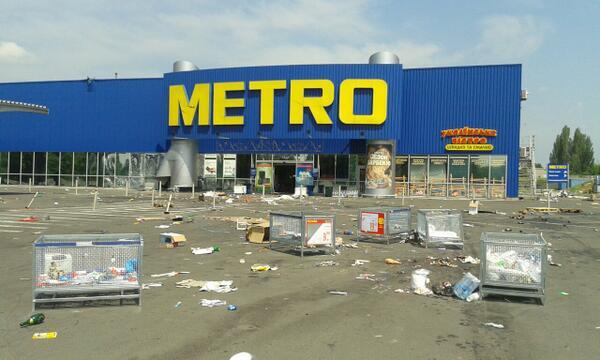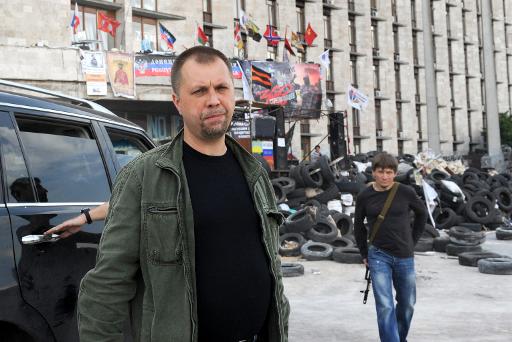The Rot Among the Rebels in Ukraine
By Anna Nemtsova

The pro-Russian “government” in eastern Ukraine, which thought it controlled the fate of the nation a few days ago, has now lost control even of its own ranks.
DONETSK, Ukraine — Slices of pineapples, batteries, flashlights, and cans of fish swam in puddles of beer on the floor, all dusted with a gooey layer of flour and cornmeal. The giant German hypermarket "Metro" in Donetsk was flooded with looters Friday morning, grabbing whatever struck their fancy from its endless shelves.

They seemed not to care that they were risking their lives. Just around the corner from the store, snipers opened fire at anyone who approached the nearby Donetsk airport. But as soon as the looters made it alive to the free consumer paradise, in a frenzy of greed or survival or both, they loaded up mountains of goods on their carts.


On the floor of the wine department, drunken Valeriy moaned that his wife expected him to pick her up from work, but he wanted to stay and live in the free-alcohol heaven; he insisted journalists not photograph his “being drunk as a pig.”
Outside the shopping center, two more drunk looters described the violent scenes of shootings earlier this week between Ukrainian National Guard forces and rebels; on Thursday the two men helped wounded local civilians to reach the hospital. The entire neighborhood was “terrorized” by stories about female snipers from the Baltic countries shooting men in the lower parts of their bodies. All that made the looting seem all right.
Unlike, Valeriy, Dmitry Yagudin realized that this could be his last chance to provide so plentifully for the six unemployed members of his family. He planned his looting carefully, eyeing the space available on his cart. He ignored bottles of expensive whiskey, blankets and hair dryers. “In wartime, one needs more serious things,” he explained, loading up blenders and juice makers. He passed right by the technology counters. “No, computers are not for me,” he said. “I am not an insane looter. If not for Ukrainian helicopters and snipers in my neighborhood, I would never do this.” Then he pushed his loot outside and up the street towards his house.

Like a big wobbling shopping cart, the entire Donetsk region, it seemed, was slowly being pushed toward a very uncertain future where the fear of death, kidnapping, economic crises, disillusionment, unemployment and the sundry unknowable horrors of civil war all mingled.
The leader of the separatist resistance, the self-proclaimed prime minister of the self -proclaimed Donetsk People’s Republic, Alexander Borodai, blamed Kiev for all the republic’s troubles.
"Ukrainian authorities do everything to create a hopeless humanitarian catastrophe in eastern cities; a week ago they stopped paying salaries to state employees in the region,” Borodai complained in an interview on the square in front of his headquarters, standing by his Infiniti loaded with gunmen, rocket propelled grenades and a machine gun in the trunk.

The problems seemed to grow on the rebellious government faster it could handle them—on Thursday, Borodai claimed his people collected six more dead comrades outside the airport. Looting at the Metro store was another headache among many, he said.
The prime minister of the self-proclaimed government also admitted it was still “a pending challenge” to unite warlords, make them responsible and obey the command of the republic’s government. Battles with Ukrainian military in Luhansk, the region on the border with Russia, and Slovyansk, the epicenter of the fighting, were not the responsibility of the separatist leaders in Donetsk, he said.

Then, more bad news arrived from the Luhansk region: on Thursday night, four observers from the Organization for Security and Cooperation in Europe (OSCE) reportedly were detained in Severodonetsk, 100 kilometers away. The team consists of four international members, as well as one Ukrainian language assistant. They were travelling in two vehicles. Another group of OSCE observers disappeared in Eastern Ukraine on the evening of May 26.
The risks did not stop the OSCE special monitoring mission from enlarging its presence in Ukraine, adding 23 people to the current team of 248.
As unrest grows in Ukraine, even Prime Minister Borodai’s 11th-floor headquarters splintered into bitter feuds. Sewage pipes burst on the 7th floor of the building, distributing a strong, rotten smell that seemed to match the mood. The commandant of the floor, Regina, a woman in a red blouse with sharp angry features, stormed into the Donetsk People’s Republic press center yelling and demanding her arm-chairs back—she believed that somebody from the self-proclaimed administration stole the two armchairs from her own office.
Quiet and upset, the press secretary, called Klaudiya, said that the republic “was on the verge of its own revolution—I hope we have prevented it.”

No comments:
Post a Comment